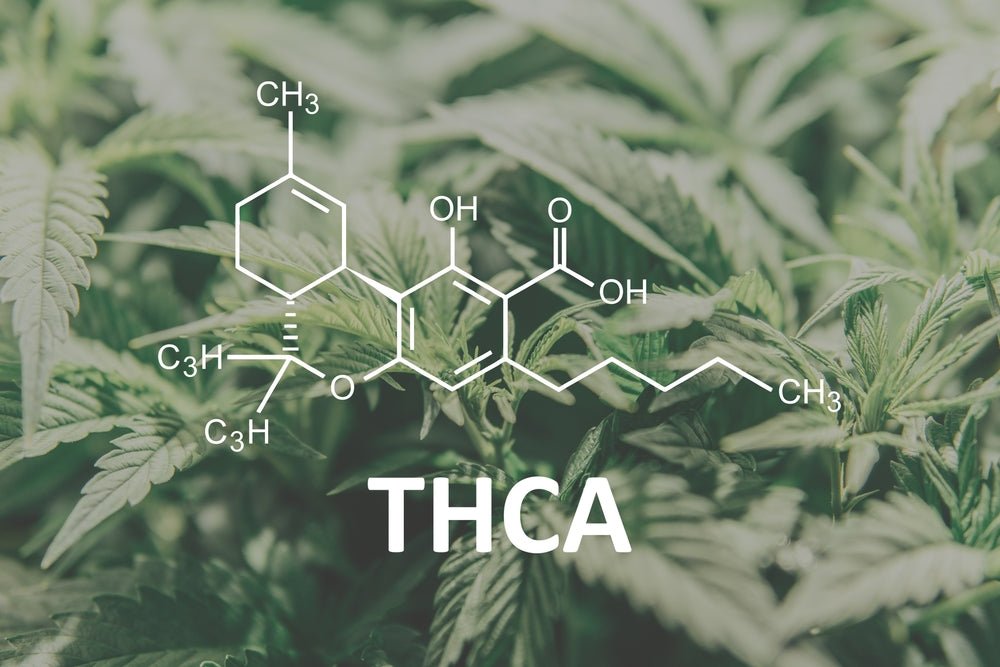What is THCA?

What is THCA? A Comprehensive Guide to this Non-Psychoactive Compound
THCA (tetrahydrocannabinolic acid) is a non-psychoactive compound found in raw cannabis plants. Unlike THC (tetrahydrocannabinol), the psychoactive compound that gives cannabis its mind-altering effects, THCA does not produce a "high" when consumed. THCA is the precursor to THC, and it only converts to THC when it is heated, such as through smoking or vaping. THCA has gained popularity in recent years for its potential therapeutic benefits, including pain relief, anxiety reduction, and neuroprotection.
How Does THCA Work in the Body?
THCA works in the body by interacting with the endocannabinoid system (ECS). The ECS is a complex cell-signaling system that plays a role in regulating a variety of functions in the body, including mood, appetite, and immune response. The ECS is composed of three main components: endocannabinoids, receptors, and enzymes. Endocannabinoids are naturally occurring compounds that the body produces to help regulate various bodily functions. Receptors are proteins that are found on the surface of cells and bind to specific molecules to initiate a cellular response. Enzymes are responsible for breaking down endocannabinoids after they have completed their function.
THCA interacts with the ECS by binding to CB1 and CB2 receptors, which are found throughout the body. THCA has a higher affinity for CB1 receptors, which are primarily located in the brain and nervous system. When THCA binds to CB1 receptors, it can help regulate neurotransmitter release, which can have a variety of effects on mood, cognition, and pain perception. THCA also has some affinity for CB2 receptors, which are primarily located in the immune system and can help regulate inflammation and immune response.
Potential Health Benefits of THCA
While more research is needed to fully understand the potential health benefits of THCA, there is some evidence to suggest that it may be effective in treating a variety of health conditions, including:
- Pain relief: THCA has been shown to have pain-relieving properties, making it a potential natural alternative to traditional pain medications.
- Anxiety reduction: THCA has been shown to have calming effects on the brain, making it a potential treatment for anxiety and stress.
- Neuroprotection: THCA has been shown to have neuroprotective properties, which can help protect the brain and nervous system from damage caused by oxidative stress.
How to Use THCA
There are several ways to consume THCA, including through raw cannabis juice, tinctures, and capsules. It is important to note that THCA is not psychoactive, so it will not produce a "high" when consumed. However, it is important to be mindful of the dosages and potential side effects of THCA.
Some potential side effects of THCA include dry mouth, dizziness, and fatigue. It is also important to note that THCA may interact with certain medications, so it is important to consult with a healthcare professional before using THCA as a treatment.
Conclusion
THCA is a non-psychoactive compound found in raw cannabis plants that has gained popularity in recent years for its potential therapeutic benefits. THCA works in the body by interacting with the endocannabinoid system and can help regulate a variety of bodily functions, including mood, pain perception, and immune response. While more research is needed to fully understand the potential benefits and risks of THCA, it shows promise as a natural remedy for pain, anxiety, and neuroprotection. As with any natural remedy, it is important to consult with a healthcare professional before incorporating
References
-
Morales P, Hurst DP, Reggio PH. Molecular targets of the phytocannabinoids: a complex picture. Prog Chem Org Nat Prod. 2017;103:103-131. doi: 10.1007/978-3-319-45541-9_4
-
Navarro G, Varani K, Reyes-Resina I, et al. Cannabigerol Action at Cannabinoid CB1 and CB2 Receptors and at CB1-CB2 Heteroreceptor Complexes. Front Pharmacol. 2018;9:632. doi: 10.3389/fphar.2018.00632
-
DeLong GT, Wolf CE, Poklis A, Lichtman AH. Pharmacological evaluation of the natural constituent of Cannabis sativa, cannabichromene and its modulation by Δ(9)-tetrahydrocannabinol. Drug Alcohol Depend. 2010;112(1-2):126-133. doi: 10.1016/j.drugalcdep.2010.05.019
-
Lewis MM, Yang Y, Wasilewski E, Clarke HA, Kotra LP, Teng L. Cannabinoids in Treatment-Resistant Epilepsy: A Review. Pharmaceuticals (Basel). 2021;14(2):104. doi: 10.3390/ph14020104
-
Takeda S, Usami N, Yamamoto I, Watanabe K. Cannabidiolic acid as a selective cyclooxygenase-2 inhibitory component in cannabis. Drug Metab Dispos. 2008;36(9):1917-1921. doi: 10.1124/dmd.108.021690
-
Leizer C, Ribnicky D, Poulev A, Dushenkov S, Raskin I. The composition of hemp seed oil and its potential as an important source of nutrition. J Nutraceuticals, Functional & Medical Foods. 2000;2(4):35-53. doi: 10.1300/J133v02n04_04



